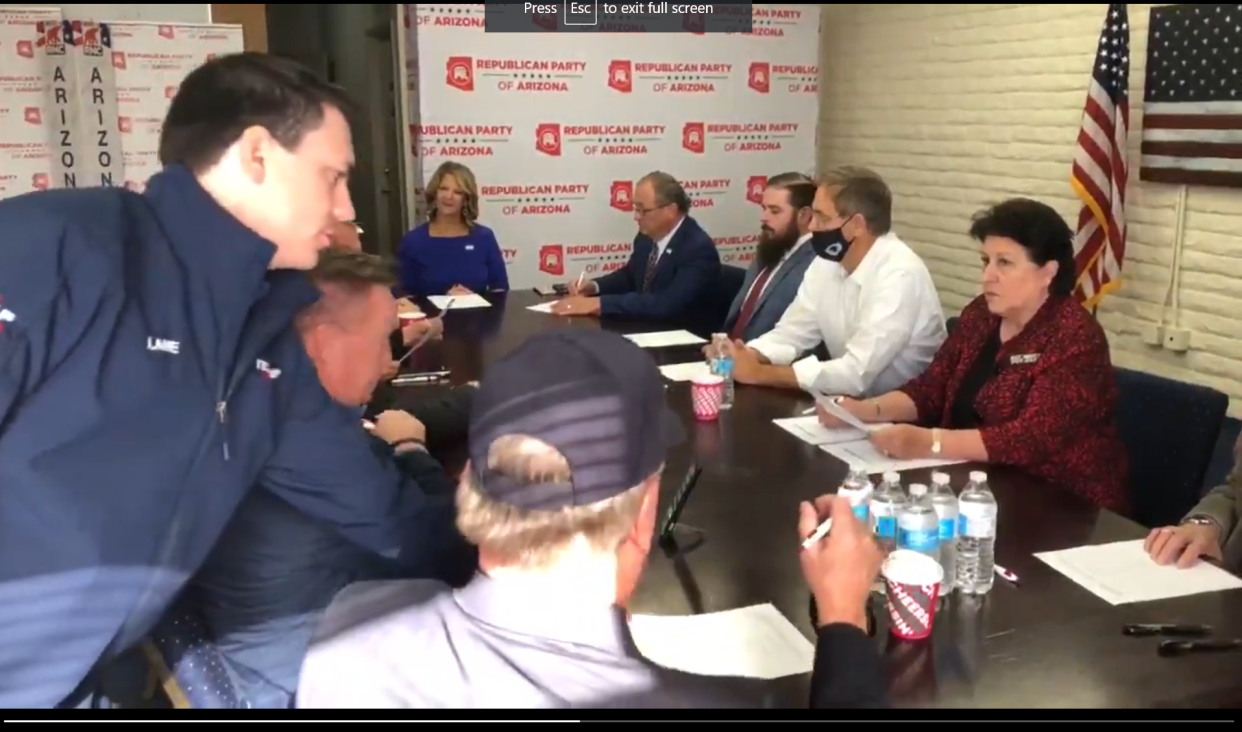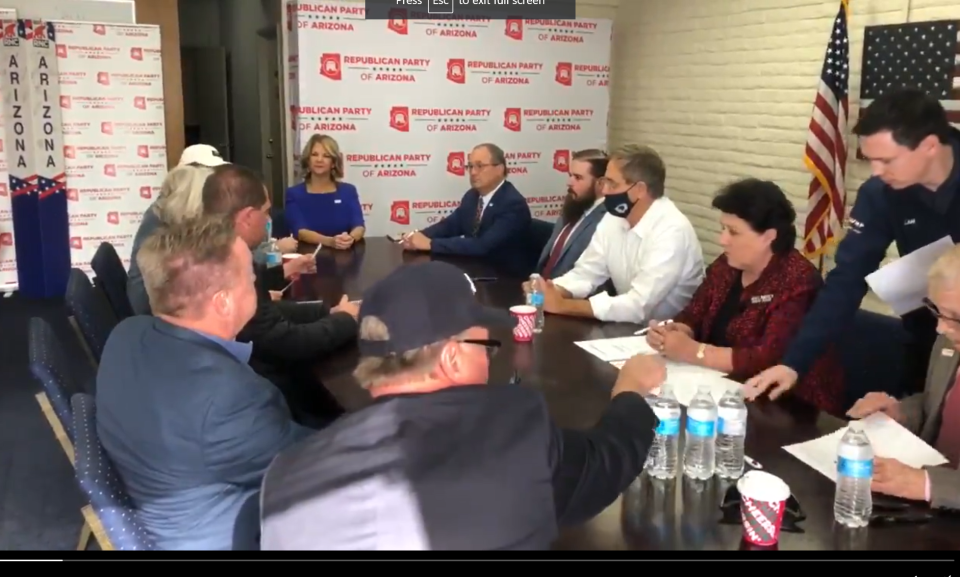Trump campaign official subpoenaed by FBI appears to be at meeting of fake Arizona electors

- Oops!Something went wrong.Please try again later.
- Oops!Something went wrong.Please try again later.
Corrections & Clarifications: A previous version of this article misspelled Loraine Pellegrino's last name.
A campaign official for President Donald Trump, who appears to be at the meeting where 11 Arizona Republicans falsely declared themselves the state’s presidential electors, was subpoenaed Wednesday by the Department of Justice, the Washington Post reported.
A man who appears to be Thomas Lane was seen in a video posted by the Arizona Republican Party in December 2020, passing out pieces of paper during the meeting where the Republicans signed documents certifying themselves Arizona’s “duly elected and qualified electors.”
In the video, the man is seen wearing a zippered jacket with Trump’s campaign logo on the right sleeve. The jacket, as seen on the video, had Lane’s last name on it.
Lane’s apparent presence in the video was first reported Wednesday by the Post.
Federal agents subpoenaed Lane and three other Republicans associated with a scheme to create alternate sets of Republican electors and send those documents to Congress, the Post reported. The FBI investigations were part of the agency’s look into the causes of the Jan. 6, 2021, riot at the U.S. Capitol.
Lane, according to his LinkedIn page, graduated from the Sandra Day O'Connor School of Law at Arizona State University in 2020. After working for the Trump campaign, he took a job as the director of election integrity for the Republican Party in Virginia, according to his LinkedIn page.
Fake electors were designed to sow confusion, memo says
The electors were part of a multifaceted and complex scheme to upend the 2020 presidential election. The fake set of electors had no legal weight, as they were not certified by any state official.
But the intent, as outlined in a memo written by Trump attorney John Eastman, was to sow confusion. Seven states, including Arizona, sent similarly worded paperwork to the National Archives and to the U.S. Senate.

The existence of the alternate slates would allow Vice President Mike Pence, according to the memo, to state he was unable to determine which slate was the official one. He could then set aside the official votes and declare Trump the winner based on the votes he could count.
Alternatively, the memo said, the matter would be thrown to the U.S. House where, under a provision also outlined in the 12th Amendment, each state would receive one vote for president. A majority of the states at the time had Republican-majority contingents, the memo said, giving another path to a Trump victory.
The campaign to effectuate this scheme, in Arizona and other states, has been the subject of the nationally televised hearings of the House Select Committee that is investigating the riot at the Capitol.
In testimony before the committee Tuesday, Arizona House Speaker Rusty Bowers described receiving phone calls from Trump and his attorney, Rudy Giuliani, the former New York City mayor. The men asked him to decertify the election and have the state legislature install the Trump electors.
Bowers refused to go along.
So, a second tactic was employed in Arizona and six other states.
The Signing. pic.twitter.com/6gPsfqrk7T
— Republican Party of Arizona (@AZGOP) December 14, 2020
What happened in the video?
On Dec. 14, 2020, 11 Arizona Republicans met at party headquarters in Phoenix. The 11 would have been Arizona’s official electors had Trump won the state; their names were listed as electors in small type near Trump’s name on the 2020 general election ballot.
After a prayer, the 11 signed documents that falsely stated they were the “duly elected and qualified” electors from Arizona.
In the video, Lane, who according to his LinkedIn page was director of election-day operations for the Trump campaign, can be seen handing out a piece of paper to eight of the 11 electors before disappearing off screen.
It is not clear from the video what the document was. The document sent to the National Archives, which that agency posted on its website, shows all 11 Republicans signed a single sheet declaring themselves the “duly elected and qualified” presidential electors.
For subscribers: Arizona House Speaker Rusty Bowers applauded on plane after testimony
Others subpoenaed for involvement
Besides Lane, the FBI issued a subpoena to three other people, according to the New York Times.
Two, David Shafer and Brad Carver, signed on as fake Trump electors from Georgia. Another, Sean Flynn, was a campaign aide in Michigan, the Times reported.
Lane did not sign on as a fake elector. His role in the scheme was not clear.
None of the 11 fake Arizona electors has detailed how they learned where to be on the day of the signing, nor explained how the documents they signed were created.
Kelli Ward, the head of the Arizona Republican Party, said in a video posted the next day that she and others who signed the document felt they represented the “true electors” from Arizona.
“We believe that we are the electors for the legally cast votes here in Arizona," she said
The House Select Committee investigating the Jan. 6 riot has subpoenaed Ward, as well as phone records belonging to her and her husband, Michael, another fake elector.
The Wards filed a lawsuit against the committee in federal court in Phoenix fighting the disclosure of their records.
The committee has also subpoenaed Nancy Cottle and Loraine Pellegrino, who signed the documents as chair and secretary. Pellegrino, in a brief phone call with The Republic in May, said that “absolutely nothing” has come from the subpoena.
Other Arizona Republicans who falsely asserted themselves as electors include Rep. Jake Hoffman of Queen Creek; former Rep. Anthony Kern, who is making a 2022 bid to return to office; Jim Lamon, a U.S. Senate candidate; and Tyler Bowyer, the executive at Turning Point Action, the political arm of the nonprofit advocacy group aimed at engaging young Republicans started by Charlie Kirk.
What fake electors hoped would happen
The documents used by Arizona’s fake electors were near-duplicates of the documents used in the six other states, including font and wording. Republicans in two states, New Mexico and Pennsylvania, inserted phrases saying that they would only be electors under certain conditions. Arizona’s contained no such ambiguous language.
Four days later, a complaint filed with the U.S. Supreme Court asked the justices to step in and resolve the disputes over the electors.
In those court documents, the meeting of the phony Arizona Republican electors would be erroneously described as taking place at the state Capitol, conferring a sheen of official legislative blessing. Electors in Georgia and Wisconsin did meet at their state’s capitol. Republican electors in Michigan tried to enter the Capitol in Lansing but were denied entry by security.
Arizona’s slate of electors later filed suit against Pence — a “friendly” gesture as described by Ward in a video — in order to ask the courts to specify that he had the power to decide which slate of electors to take.
The notion that Pence had such authority was pushed by Eastman, the Trump attorney, according to previous committee testimony.
Eastman found ambiguity in the procedure for counting the Electoral College votes outlined in the 12th Amendment to the U.S. Constitution. Specifically, Eastman pointed to the phrase: “… and the votes shall then be counted.”
He saw the fact that phrase was written in the passive voice as meaning that the vice president would have sole authority on which votes to count.
Congress, in 1877, had passed a more specific law dictating how Electoral College votes would be counted, specifically how to settle disputes. But Eastman was among a set of scholars who saw that law as being unconstitutional.
Trump claims he wanted legislatures to look at fraud
Eastman’s reasoning apparently made sense to Trump.
In a speech in Nashville on June 16, Trump said that he was astounded when other advisers told him that Pence had no authority to toss out states’ votes, even if he thought there was fraud. Trump said it didn’t make sense to him that Pence would have “no choice but to be a human conveyor belt.”
Trump, in that speech, said he didn’t expect Pence to unilaterally decide the election, or throw the question to Congress. Instead, he said he thought Pence should have sent the certifications back to the state legislatures.
“I wanted him to send it up to the legislatures,” Trump said, “if they see the same kind of fraud, and if they see the same kind of irregularities that I saw.”
Eastman, according to testimony last week, told members of Pence’s legal team that he knew his scheme wouldn’t pass legal muster, admitting he would lose at the U.S. Supreme Court by a 7-2 vote at best.
After the Jan. 6, 2021, riot and in the waning days of Trump’s presidency, according to the committee, Eastman asked for a preemptive pardon.
“I've decided I should be on the pardon list,” Eastman wrote in a text message to Giuliani, “if that is still in the works.”
This article originally appeared on Arizona Republic: FBI subpoenas Thomas Lane, who directed Trump campaign in Arizona

